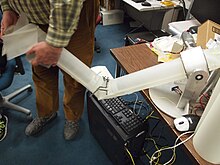Christopher G. Atkeson
Christopher G. Atkeson | |
|---|---|
 | |
| Born | 28 May 1959 |
| Nationality | American |
| Alma mater | |
| Spouse | Jessica Hodgins |
| Scientific career | |
| Fields | Robotics and Machine Learning |
| Institutions | |
| Thesis | Roles of knowledge in motor learning (1986) |
| Doctoral advisor | Emilio Bizzi |
Christopher Granger Atkeson (born 28 May 1959) is an American roboticist and a professor at the Robotics Institute and Human-Computer Interaction Institute at Carnegie Mellon University (CMU).[1] Atkeson is known for his work in humanoid robots, soft robotics,[2] and machine learning, most notably on locally weighted learning.[3]
Early life and education
[edit]Atkeson graduated summa cum laude from Harvard University in 1981 with an A.B. in biochemistry. He received his S.M. degree in applied mathematics in the same year, also from Harvard. He then attended the Massachusetts Institute of Technology and received his PhD in brain and cognitive science from them in 1986, advised by Emilio Bizzi.[4]
Career
[edit]Before joining the faculty at CMU in 2000, he was an assistant, then associate professor in the department of Brain and Cognitive Sciences at MIT from 1986 to 1993. He was also an associate professor at the College of Computing, Georgia Institute of Technology from 1994 to 2000.[5]

Atkeson's work in soft robotics helped influence production on the 2014 Disney film Big Hero 6, and he consulted with the film's production team on the design of Baymax.[7]
Honors and awards
[edit]- National Science Foundation Engineering Initiation Award, 1987–1988.
- National Science Foundation Presidential Young Investigator Award, 1988–1993.
- W. M. Keck Foundation Assistant Professorship in Biomedical Engineering, 1988–1990.
- Alfred P. Sloan Research Fellow, 1989–1991.
- W. M. Keck Foundation Associate Professorship in Biomedical Engineering, 1990–1991.
- Teaching Award from the MIT Graduate Student Council, 1990.
- Edenfield Faculty Fellowship Award, 1995.
- Elected by faculty to College of Computing Dean's Advisory Committee, 1995–1996, 1996–1997.
- Finalist, Best Paper Award, ICRA 2000.
Personal life
[edit]Atkeson is married to Jessica Hodgins,[8] Professor of Computer Science and Robotics at CMU,[9] and former director of Disney Research, Pittsburgh.[10]
References
[edit]- ^ "Christopher Granger Atkeson - Google Scholar Citations". scholar.google.com. Retrieved 9 March 2018.
- ^ Hardy, Quentin (14 April 2015). "The Robotics Inventors Who Are Trying to Take the 'Hard' Out of Hardware". The New York Times. ISSN 0362-4331. Retrieved 15 August 2016.
- ^ Atkeson, C.G.; Moore, A.W.; Schaal, S. (1997). "Locally weighted learning". Artificial Intelligence Review. 11 (1): 11–73. doi:10.1023/A:1006559212014. S2CID 9219592.
- ^ "PDS SSO". library.mit.edu. Retrieved 9 March 2018.
- ^ "Chris Atkeson's Home Page". www.cs.cmu.edu. Retrieved 9 March 2018.
- ^ Ulanoff, Lance (7 November 2014). "'Big Hero 6' star Baymax was inspired by a real robot". Mashable. Retrieved 20 January 2019.
- ^ Trimboli, Brian (9 November 2014). "CMU's soft robotics inspire Disney's movie Big Hero 6 - The Tartan". The Tartan. Carnegie Mellon University. Retrieved 15 August 2016.
- ^ "Audrey Hodgins". Retrieved 9 March 2018.
- ^ University, Carnegie Mellon. "QoLT Center - QoLT Center - Carnegie Mellon University". www.cmu.edu. Retrieved 9 March 2018.
- ^ "Alumni - Disney Research". Disney Research. Archived from the original on 10 March 2018. Retrieved 9 March 2018.
External links
[edit]- American artificial intelligence researchers
- Georgia Tech faculty
- Carnegie Mellon University faculty
- Living people
- Machine learning researchers
- American roboticists
- 1959 births
- Massachusetts Institute of Technology School of Science alumni
- Sloan Research Fellows
- Disney Research people
- Harvard John A. Paulson School of Engineering and Applied Sciences alumni
